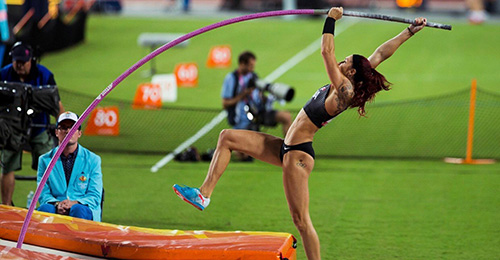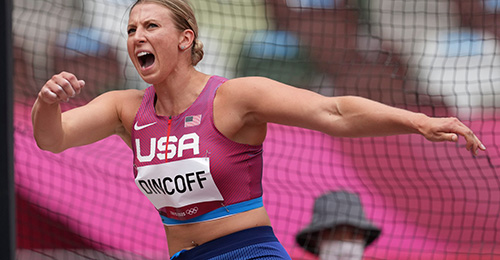PHILOSOPHY & THOUGHTS
1. What would you say the 3 main keys to your teams successes have been? 1 - Discipline - Beginning with the first day handout, discuss goals, grades, expectations, consequences, workouts, positive thoughts to live by, and the positive socialization of the sport - just how great it is to be a harrier and how unique the experience is!!!!! 2 - Developing the “family” feel of the sport of XC with the team family building through the season’s training regimen, the parental support through team dinners and volunteer efforts by the parents at meets, and finally the community and school support systems through tutoring, newspaper columns, pep assemblies, volunteers, special community recognitions - police escorts after successes through town, etc. 3 - Careful planning and education - It is imperative that the head coach has a daily, weekly, and seasonal outline - It is vital that athletes know that you know where the teams headed, plus it is a backup to any legal problems that could arise. Also, your on-going learning about the sport is important through attending clinics, reading up on the latest information concerning the sport on-line, in books, and journals - I have yet to meet the coach who knows it all - There’s always a sharper knife in the drawer!!
2. What is your basic philosophy on training ? (Run everyday a minimum of ? Hills are the Key? Mileage, mileage, mileage? Effort over pace?…etc) Depending on when during the season, early on getting the base in is important both in and out of practice, hill work at least once a week ( if you don’t have any hills, use bleachers ) hitting the weights are of value - only to tone , not build football muscles, but mileage and effort - not the clock - are important in the beginning. Pace and speed work come later in the season.
3. Miles or minutes or both? In the beginning miles are more important and as your athletes begin to develop a base, put them on the watch.
4. Effort training or Pace training? Does each have a place? Answered in #3.
5. Focusing on the watch during a race…good?bad?not an issue? The focus on the watch falls primarily to your asst. coach and manager - The head coach’s main focus is being the vocal encourager to the runner with watch in hand.
6. Running the race vs racing the race. Is there a difference and if so, how do you get your kids there? It depends on your definition of terms. Running the race means means just that - you show up and run. Racing the race means you are there to win it and leave it all on the course.
7. Trail running importance? Trail running is a joy to XC runners - Get them on the trail as much as possible - They get in the miles and don’t even notice the angst, just the scenery and it helps build the team feeling.
8. Solving the championship peak puzzle, what steps do you take or thoughts do you have to get your kids to have their best race at the right time? You bring together discipline, team family, and the solid seasonal workout plan and voila - you’re there!!
SEASON STRATEGIES & PLANNING
1. What are the workout goals of your:
a. early season? Build your base
b. mid season? Begin pace
c. late season? Speed work
d. championship season? Put it together
2. What type of workouts would you define as a hard day ? a recovery day? Hard day - repeats Recovery day - easy trail mileage
3. A lot of coaches talk about a ‘Hard/Easy” schedule. Is this your workout strategy?
4. Using the table below, what would be an example of your GENERAL hard/easy schedule, OR if that is not your training strategy, show how your GENERAL training schedule would look.
|
MONDAY |
TUESDAY |
WEDNESDAY |
THURSDAY |
FRIDAY |
SATURDAY |
SUNDAY |
| Mileage | Hills
|
Repeats or Intervals | Easy Mileage/Weights
|
Time Trial |
Race Day |
Run for fun with a Partner |
5. Race every meet? Thoughts and lessons learned? If you mean, should you hold back runners in a meet, it would depend on the runner. If you mean, race to win each meet or shift athletes around, there is nothing wrong with experimentation, plus the only two meets that count are District and State with the other meets being tune ups and discovery.
6. Is cross training used during your season? If so, how? I have used the pool, especially if injuries abound.
DO’S AND DONT’S FOR: (These are very quick hit answers as cues. You can elaborate if needed)
1. Running form:
a. DO - Practice from the first session
b. DON’T-allow your best runners to use improper form
2. Race day:
a. DO - Establish a meet protocol that the athletes get used to and are comfortable to get in the zone for competition.
b. DON’T- allow your runners to do your protocol on their own - have an asst. coach there - athletes will be tempted to take minimal efforts or short cuts.
3. Racing:
a. DO - Establish that the athletes run their best each time - effort and improvement are the goals.
b. DON’T-accept less than their best efforts - have a private conversation with the athlete - help them through their tough moment.
4. Summer training:
a. DO - Make it fun and cool to be a part of for the athletes - They love popcicles!!
b. DON’T- get down on the athletes who are kept out of practice by their parents - devise a program that they do at home.
5. Late season refinement:
a. DO - Keep it intense and fun!!
b. DON’T- overwork your athletes at this stage - you don’t want injuries at this point.
6. Meet/race scheduling:
a. DO - Go to the tough meets as often as possible because that’s how you get better.
b. DON’T- schedule nothing but easy meets - you might win meets and bring home trophies, but you’ll pay a big price at the District and State.
7. Injuries:
a. DO - Take care of injuries right a way - Make sure they are for real - Don’t let them come back to practice unless they have been cleared by their doctor or the athletic trainer.
b. DON’T- allow athletes to come back because they say they have been cleared - always get it in writing - it’s called liability!
8. Team & individual motivation:
a. DO - We coaches motivate,but not like a team leader does with his/her peers
b. DON’T- give the team carte blanche - always verify what they intend to do to motivate the team - keep an open mind, but under control of the team’s direction.
2015 Cross Country Summit - Legends Series, Part 2 (6:20pm - 7:30 on Monday, July 27th, 2015)
TRAINING
1. Differentiation? General goal miles or minutes for each season phase for a; 1) Beginning Runner (Female/Male), 2) Experienced runner (Female/Male), 3) Advanced Runner (Female/Male)
|
EARLY SEASON |
MID SEASON |
LATE SEASON |
CHAMPIONSHIP SEASON |
|||||
|
MALE |
FEMALE |
MALE |
FEMALE |
MALE |
FEMALE |
MALE |
FEMALE |
|
|
Beg Runner |
20 Miles per week |
Same |
25 Miles per week |
Same |
No Change |
No Change |
At this point , the hay is in the barn!! Athletes may choose to run more on their own with the advice of the coach!! |
Same |
|
Exp Runner |
30 Miles per week |
Same |
35 Miles per week |
Same |
No Change |
No Change |
It’s not the quantity, but the quality!! |
Same |
|
Adv Runner |
40 Miles per week |
Same |
45 Miles per week |
Same |
No Change |
No Change |
Same |
Same |
2. What tells you that an athlete is ready for another level of training? It is his/her attacking the workout, the look in the eyes, the verbal passion, and the fire in the belly displayed,
3. Speed Training? - when & how? Late season
4. If you could schedule what would would be your perfect last 2 weeks of training before State…give us a basic idea of what would it look like:
|
MONDAY |
TUESDAY |
WEDNESDAY |
THURSDAY |
FRIDAY |
SATURDAY |
SUNDAY |
| Group Fun Run | Intra-squad Meet | Pool Practice | Last Time Trial - Pasta Dinner
|
DISTRICTS??? |
DISTRICTS??? |
Example of workout |
|
MONDAY |
TUESDAY |
WEDNESDAY |
THURSDAY |
FRIDAY |
SATURDAY |
SUNDAY |
| Mountain Run | Seniors Choice | Pool Practice
|
Team Run for Fun/ Parent Pasta Night |
Travel to State/ Run the Course |
STATE CHAMPONSHIPS!!! |
Plan for NEXT YEAR!!! |
5. Favorite workout that you as a coach look forward to & why?300’s,Mile repeats, and 800 repeats - It’s the look in the athlete’s eyes!!
6. Favorite workout your kids look forward to and why? The pool - Guess Why!! The mountain runs were their favorites.
7. Your favorite "go-to" specific course element workout for (pick 2) hills/start/passing/sharp turns/sand/downhill running……? Hills and passing
8. Explain your most beneficial recovery routine/technique after workouts? Plyos - Nigerian cool down
9. The 2 biggest mistakes you see runners making during training and solutions? Bad form and running tight
MOTIVATION
1. What technique do you use to inspire off season commitment? Get them involved in track and convince them that they don’t want to lose their edge for XC in the fall since they have finished on an up note!!!
2. How do you beat the 3rd quarter lull (That time in the season when athletes may lose focus, motivation or get in a training rut ? It’s time for some pool workouts or back to the mountains.
3. Your key team & individual motivational technique? I always would make an emotional and physical connection with each athlete each practice - examples - emotional - always find something positive to reinforce verbally/ physical - a high five or a shoulder hug.
INJURY PREVENTION
1. Two signs of overtraining and solutions? Most obvious - injury/ lethargic or depressed - late to practice, etc.
2. Two most common injuries to be aware of? Shin splints and blisters
3. Your favorite routine/exercises for injury prevention? Toe raises on the edge of the track for shin splints and proper fitting shoes and good socks for blisters and a gradual buildup of practice so as to avoid overdoing it and creating injuries - stretches and plyos.
4. What are the most common red flags that tell you that an athlete needs days off? Repeat of # 1.
5. Alternative training through an injury or rest? The pool or bike riding are good.
6. What determines when an athlete is ready to resume training after an injury? His/her doctor or your athletic trainer, plus the athlete will be anxious to get back in the saddle.


 Larry Chavez is the 112th inductee into the NMAA Hall of Fame, with a career in education that spanned over 38 years. He devoted his entire career to the youth of New Mexico.....
Larry Chavez is the 112th inductee into the NMAA Hall of Fame, with a career in education that spanned over 38 years. He devoted his entire career to the youth of New Mexico..... Newell, a graduate from Highland High School and 3-time State Champion, has attended two Olympic games for team Canada.
Newell, a graduate from Highland High School and 3-time State Champion, has attended two Olympic games for team Canada. Former New Mexico State volunteer assistant track and field coach Rachel Dincoff reached the pinnacle of her event...
Former New Mexico State volunteer assistant track and field coach Rachel Dincoff reached the pinnacle of her event...